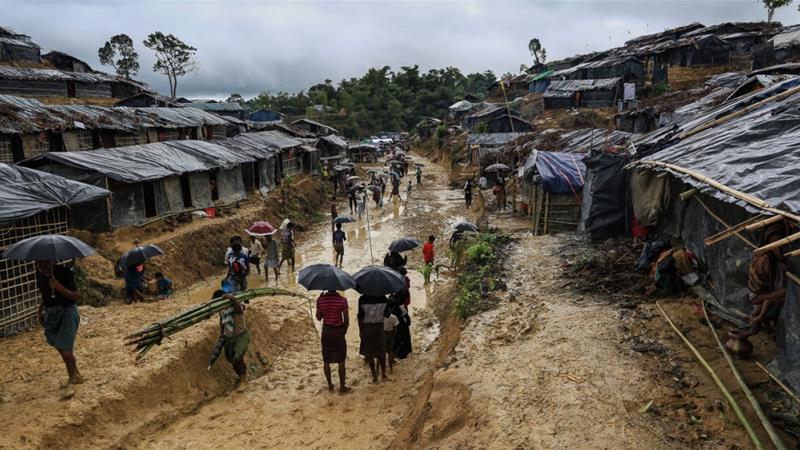![Rohingya must be consulted before repatriation Rohingya refugees are living in squalor in camps in Bangladesh [Showkat Shafi/Al Jazeera]](http://www.aljazeera.com/mritems/imagecache/mbdxxlarge/mritems/Images/2017/9/25/b6c6a7ac073944779a84b1a611c07f0e_18.jpg)
Kuala Lumpur, Malaysia – A Rohingya repatriation deal is being hailed as a “first step” by the Bangladesh government, but many argue the plan is premature.
Myanmar’s Rakhine state is the ancestral home for Muslim-majority Rohingya, but those living there face discrimination, violence, and segregation. Human rights group Amnesty International calls it a “system of apartheid“.
The repatriation deal does not take Rohingya refugees’ rights into consideration, said the European Rohingya Council (ERC). Its Malaysia ambassador, Tengku Emma Zuriana, has spoken out against it.
“This repatriation process should not proceed until the safety of the Rohingya [can be] ensured,” she said.
Malaysia is home to about 150,000 Rohingya. Several non-government organisations held a press conference here on Thursday to discuss the repatriation plan.
The United Nations and United States have stated the violent actions taken by Myanmar’s armed forces and “local vigilantes” amount to ethnic cleansing against its Rohingya minority.
“This must be a voluntary process, in safety and dignity, and for them to return to their homes – not into camps. And if there’s any loss of property and life, it must be compensated fairly,” Zuriana said.
Malaysian civil society groups and faith-based organisations urged the Myanmar government to end the violence, and to ensure the safety of the Rohingya living in Rakhine state before any repatriation process begins.
The Malaysia Consultative Council of Islamic Organisation (MAPIM) said any repatriation deal must include protection and compensation for Rohingya refugees in Bangladesh who’ve lost everything amid the heavy-handed “security clearance” operation.
“Even if the agreement has been finalised, we strongly call on the UN to ensure safe passage for the Rohingya to return back to their homes,” said MAPIM President Mohd Azmi Abdul Hamid.
He went on to ask the international community and the Association of Southeast Asian Nations (ASEAN): “What repatriation are they planning to implement when the Rohingya’s’ lives are totally destroyed?”
Myanmar Ethnic Rohingya Human Rights Organization Malaysia (MERHROM) wanted to remind Bangladesh of past Rohingya repatriations to Myanmar.
“[An] estimated 240,000 Rohingya were repatriated by the Bangladesh government under the 1978 agreement, which had a six month time limit. After that, Bangladesh repatriated about 236,000 Rohingya until 2005 under the 1992 agreement,” noted MERHROM President Zafar Ahmad.
In 2012, Myanmar’s armed forces began to force Rohingya into refugee camps, both in Rakhine state and across the border into Bangladesh.
Recent attacks on a police outpost in Rakhine state by the armed group Arakan Rohingya Salvation Army (ARSA) sparked the latest army crackdown. More than 600,000 Rohingya fled their homes into Bangladesh’s refugee camps.
 |
| Hundreds of thousands have fled since late August [Al Jazeera] |
MERHROM wants the UN Security Council to conduct an assessment of the situation in Rakhine state, to ensure military operations against Rohingya have ceased.
Myanmar Armed Forces Senior General Min Aung Hlaing has said the Rohingya could return only if they are “real citizens”.
The UN said on Friday the time wasn’t right for a Rohingya return.
“At present, conditions in Myanmar’s Rakhine state are not in place to enable safe and sustainable returns. Refugees are still fleeing, and many have suffered violence, rape, and deep psychological harm,” said Adrian Edwards, a spokesperson for the office of the UN High Commissioner for Refugees.
“It is critical that returns do not take place precipitously or prematurely, without the informed consent of refugees or the basic elements of lasting solutions in place,” headded.
Rohingya refugees in Bangladesh and Malaysia agree they must be consulted.
“Until the Myanmar government is serious to improve the situation, the Bangladesh government should not agree to any repatriation plan,” Zuriana said.
“The European Rohingya Council is calling [on] Myanmar authorities to grant full citizenship to the Rohingya and review the [1982] citizenship law.”
ERC called on the international community to send a clear message to Myanmar that it will not tolerate any further violence. It also said it wants to see the UN observe, support, and monitor all investigations into human rights violations.
Humanitarian agencies providing aid and medical services to the Rohingya in Rakhine state are not allowed to access secured areas, where those most affected need urgent help.
Until unhindered access is granted to aid agencies in Rakhine by the Myanmar government, refugee and civil society groups in Malaysia will continue to voice opposition to any agreement, they said.
The concern is Myanmar will force returning Rohingya into displacement camps and settlement zones protected by the same armed forces guilty of carrying out attacks them.
“They don’t have the freedom to go back home,” Zuriana said.
SOURCE: AL JAZEERA NEWS



